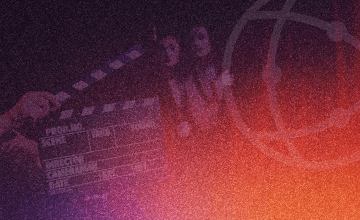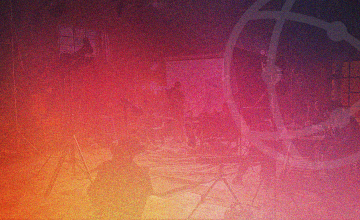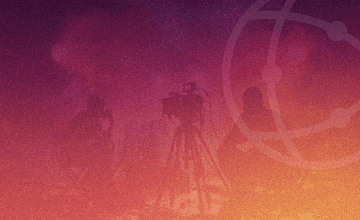Mykyta Lyskov’s new short film, ‘Kyiv Cake,’ explores themes of survival and resilience in Ukraine through surreal animation. The film, which recently won an award at the Kyiv International Short Film Festival, combines humor and tragedy to depict the harsh realities faced by families during conflict.
Kyiv Cake is the latest short film from Mykyta Lyskov, known for his acclaimed 2019 work Deep Love, which gained recognition at various festivals including Annecy and Clermont Ferrand. The film recently won the Best Ukrainian Film award at the Kyiv International Short Film Festival (KISFF) and is set to be screened at the upcoming Ottawa International Animation Festival.
The film opens with a deer happily trotting along while singing a catchy 1990s-style dance track. However, the tone quickly shifts from whimsical to somber. A man wakes up next to his wife and turns on the power, immediately facing the daunting electricity meter. As he brushes his teeth, the toothpaste resembles the colors of the Russian flag, and he continues despite losing a tooth. The couple has a child, and their fridge is nearly empty except for a single box of Kyiv Cake, which contains a passport. The wife awakens to find her husband transforming into a bird at the window, while their baby cries. The man takes flight, leaving the woman to endure the hardships of life. Just when it seems things cannot get worse, a missile strikes their building, prompting the boy to defiantly shout, “Russian warship, go fuck yourself!”
Kyiv Cake is a blend of surrealism, humor, and tragedy, often all at once. The cake itself symbolizes more than just a dessert; it represents memory, identity, survival, and irony. Lyskov explains the significance of the film’s title: “This is a really delicious cake that I regularly treat my friends to on my birthday. But if you delve into the symbolism, inside the box is not just a Ukrainian passport, but a passport for traveling abroad. It explains why the father flies away and returns with euro money.” The film was initially titled Bird’s Milk, but Lyskov felt Kyiv Cake was more fitting as it directly connects to Ukraine.
The title also serves as a political reference, as former president Petro Poroshenko owns a confectionery empire that produces Kyiv cakes and signed the 2018 agreement with the EU that allowed Ukrainians visa-free travel. Lyskov does not simplify his allegories; instead, he immerses viewers in a rich tapestry of symbols, such as toothpaste that damages teeth, McDonald’s boxes in an empty fridge, and a father sprouting feathers. “For Ukrainians, all the symbols are interpreted unambiguously,” he notes. “I know foreign audiences won’t catch every reference, but I’m tired of films that try to be clear to everyone on the planet. I want to speak my language.”
The film captures the essence of lived experiences, blending humor and trauma into a dreamlike narrative. The electricity meter serves as a recurring motif, marking the passage of time through years—2014, 2018, 2022, and nearly 2026—before the screen fades to black. Lyskov shares, “At the end of each month, I have to check my electricity and gas meters and calculate what I owe. I started to fear these devices because the bills kept rising. Poor people often have huge debts for utilities. That’s why I portrayed the meters as antagonists—markers of time.”
Despite the film’s serious themes, it is infused with absurd humor, featuring a singing deer and exaggerated depictions of daily life. “Laughter really helps—it devalues fear,” Lyskov explains. “The film is a collage of emotions; it can be funny and bitter, sad and optimistic at the same time.” Humor in this context is not an escape but an act of defiance against fear.
The narrative follows a family through years of absence, hunger, and resilience. The father leaves to fight or work abroad, and the boy inherits not only his father’s silhouette but also his spirit. Both father and son sport the traditional Cossack forelock hairstyle, a symbol of cultural identity that survived Soviet attempts to erase it. “This shows that even though the Soviet Union tried to erase our identity, it remained deep in our subconscious,” Lyskov states. “For me, 2014 to 2025 is a time of awakening—of realizing what it means to be Ukrainian and returning to the roots.”
In Kyiv Cake, the surreal elements reflect the harsh realities of life in Ukraine. The film was created under the constant threat of war, as Lyskov lives in Dnipro, a city close to the conflict. He worked remotely with Estonian animators while facing the daily dangers of living in a war zone. “At night, my wife and I often woke up to explosions near our house,” he recalls. “The constant threat sobered me as an artist. I asked myself: if tomorrow I am gone, is what I’m drawing really what I want to leave behind?”
Ultimately, Kyiv Cake is more than just a surreal short film; it is a testament to absurd survival, capturing the complexities of laughter amidst hardship. The film is distinctly Ukrainian—layered, bittersweet, and resilient. The cake conceals a passport, the bird takes flight, the tooth falls, and the missile strikes. Yet, through it all, people continue to laugh, embodying the spirit of survival and remembrance.
Disclaimer: This article has been auto-generated from a syndicated RSS feed and has not been edited by Vitrina staff. It is provided solely for informational purposes on a non-commercial basis.






























